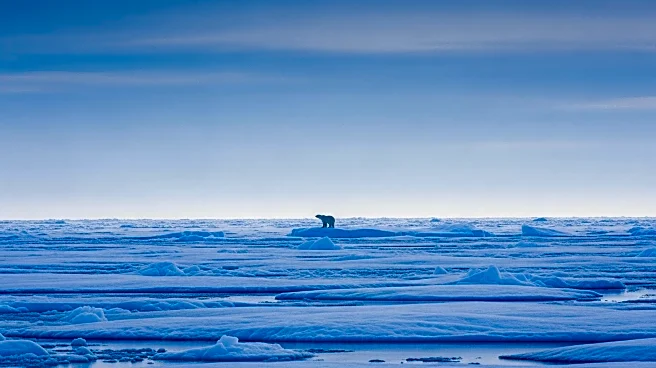What is the story about?
What's Happening?
The Arctic sea ice extent has reached its annual minimum, tying with 2008 for the 10th-lowest on record at 4.60 million square kilometers. This measurement, taken on September 10, reflects ongoing trends of declining ice coverage due to rising global temperatures. NASA and the National Snow and Ice Data Center have been tracking these changes since 1978, noting a consistent downward trend. Although the melting slowed in early August, it was insufficient to alter the overall decline. The lowest recorded extent occurred in 2012, attributed to a combination of warming atmospheric conditions and unusual weather patterns.
Why It's Important?
The reduction in Arctic sea ice is a significant indicator of climate change, affecting global weather patterns and ecosystems. The decline in ice coverage impacts marine habitats and contributes to rising sea levels, posing risks to coastal communities. The data underscores the urgency of addressing climate change through policy and innovation. As ice coverage continues to decrease, the implications for biodiversity and human activities in the Arctic region become increasingly critical, necessitating international cooperation and sustainable practices.
What's Next?
Continued monitoring of Arctic sea ice will be essential to understanding the long-term impacts of climate change. Scientists and policymakers may focus on developing strategies to mitigate the effects of ice loss, including reducing greenhouse gas emissions and promoting renewable energy sources. The data may also inform global climate agreements and initiatives aimed at preserving Arctic ecosystems. As the situation evolves, collaboration between nations and scientific communities will be crucial in addressing the challenges posed by diminishing ice coverage.
Beyond the Headlines
The cultural and geopolitical dimensions of Arctic ice loss are significant. Indigenous communities in the Arctic rely on ice-covered regions for traditional practices and livelihoods, facing disruptions as ice diminishes. The geopolitical landscape may shift as nations vie for access to newly navigable waters and resources. Ethical considerations regarding environmental stewardship and the rights of indigenous peoples will be central to discussions on Arctic policy and conservation efforts.

















